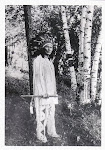Ohiyesa negotiated so many concerns, longings, and duties, and he was so grounded in his own self that did not fit into any one camp of thought on American Indian issues. Even while he was alive, people tried to pigeonhole him into a perspective that suited their views, reducing his complexity. He obviously ran into racism in the white world, and many wanted to portray him as the perfect "assimilated Indian", which he resisted. But he also encountered some hostility from his own people and from other American Indians of the time.
He was criticized by a minority as being an "apple" -- red on the outside, white on the inside -- or not Dakota or Indian enough, for varied reasons:
* he left the reservation life and never came back to live in Flandreau to settle on his allotment;
* he married a white wife and encouraged intermarriage, and spoke well of her throughout his life, even after separation;
* he became famous and some thought he had therefore forgotten or neglected his own;
* he chose to be a practicing Christian and promoted the "Christ philosophy" even while maintaining his personal "Indian faith" and prayer rituals -- noting the similarities in their essential religious truths and criticizing the white Christian society that didn't live up to its own beliefs.
* he worked for over a year on re-establishing treaty rights that had been negated in 1862, and he advocated that he receive payment for this -- some believed that he didn't deserve the money he received;
*because he recommended the outlawing of peyote, feeling the natural narcotic would sap the energies of Indian peoples like alcohol;
* because he criticized the "demoralization" and apathy he witnessed on reservations, advocating a return to many traditional disciplines of outdoors training, fitness, and values;
* because he pushed for citizenship as a choice for all American Indians so they could have a say in the courts, a vote, and a part in the political processes that ruled their lives -- (others wanted no part in the United States and wanted to go back to being considered completely separate Indian nations. which he didn't see as possible any longer);
* because at times he spoke for "Indians" or "the Indian" instead of just for himself or as a Dakota.
* because he advocated for land allotments so American Indians could have some land of their own that the government couldn't take away at will and that agents couldn't rule.
* because he pushed for the abolishment of the BIA, while also at times working for it.
He spent his lifetime educating whites on Dakota values and ways (and reminding the Dakota of their past); lobbying presidents and Congress for American Indian rights; collecting and preserving Dakota and Indian stories and history; co-founding the Society of American Indians; speaking out for American Indian religious freedom, maintaining his kinship and friendship ties in the Dakota communities, etc. The list goes on.
He didn't live his life in a path already made. He used the Dakota training instilled in him in his early life to embrace a new life and keep the wisdom and ways of the past alive in new forms in the new world. To him, it was not all loss.
He thrived on travel and the new cultures he encountered and friends he made. He was dedicated to his Dakota-white family -- despite struggles and elements of separation -- and he loved loved studying American and world history and enjoyed greatly much of the music, arts, literature he encountered. To him, it all emanated from the Creator of Life and he refused to consider only those things that were Dakota as good. He considered all things in their essence and urged others to do so.
"We of the twentieth century know better! We know that all religious aspiration, all sincere worship, can have but one source and one goal. We know that the God of the lettered and the unlettered, of the Greek and the barbarian, is after all the same God; and, like Peter, we perceive that He is no respecter of persons, but that in every nation that feareth Him and worketh righteousness is acceptable to Him."
The Soul of the Indian
Saturday, July 17, 2010
Subscribe to:
Post Comments (Atom)





No comments:
Post a Comment